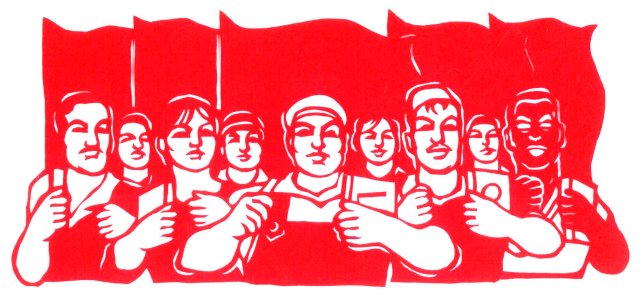One a set of 10 cutout propaganda stencils to support the Cultural Revolution in China. Topham/Topham Picturepoint/Press Association Images

Eric Weinstein is a clever chap. Not only is he a topflight mathematician and economist, he’s also the managing director of Thiel Capital – an investment firm founded by the tech industry legend Peter Thiel.
He’s been thinking about the future of capitalism (and whether it has one). Interviewed for Vox by Sean Illing, his words are worth reading:
“It seems to me that the greatest danger is that the truly rich, I’m talking nine and 10 figures rich, are increasingly separated from the lives of the rest of us so that they become largely insensitive to the concerns of those who still earn by the hour. As such, they will probably not anticipate many of the changes, and we will see the beginning stirrings of revolution as the cost for this insensitivity.”
That said, Weinstein believes the billionaires have woken up to the danger:
“There was a quiet shift several years ago where the smoke-filled rooms stopped laughing about inequality concerns and started taking them on as their own even in private…
“I think it’s a combination of both embarrassment and enlightened self-interest that this class — several rungs above my own — is trying to make sure it does not sow the seeds of a highly destructive societal collapse, and I believe I have seen an actual personal transformation in many of the leading thinkers among the technologists, where they have come to care deeply about the effects of their work. Few of them want to be remembered as job killers who destroyed the gains that have accumulated since the Industrial Revolution.”
That’s encouraging, but what sort of solution does Weinstein envisage?
“…some kind of hybridization of hypercapitalism and hypersocialism must enter the discussion.”
Personally, I’d prefer a much more modest form of capitalism combined with no socialism, but never mind – let’s see what he means by “hypercapitalism”:
“I believe capitalism will need to be much more unfettered. Certain fields will need to undergo a process of radical deregulation in order to give the minority of minds that are capable of our greatest feats of creation the leeway to experiment and to play, as they deliver us the wonders on which our future economy will be based.”
Letting the tech lords do whatever the heck they like, then. But what about the “hypersocialism”?
“…we have to understand that our population is not a collection of workers to be input to the machine of capitalism, but rather a nation of souls whose dignity, well-being, and health must be considered on independent, humanitarian terms.”
Now you’re talking, Eric! Except that’s not socialism, hyper or otherwise, but the moral philosophy at the heart of Catholic social teaching (and comparable ethical systems).
As for specific policies, Weinstein provides a hint as to the tech lords’ thinking:
“…in terms of wanting to leave a socially positive legacy, many of them are motivated to innovate through concepts like universal basic income, finding that Washington is as bereft of new ideas in social terms as it is of new technological ones.”
The thing about universal basic income (UBI) is that it requires money – lots and lots of money. Ideally, one would tax the super-productive robot workers of the future so that we humans could live a life of leisure and/or spiritual fulfilment; but, unfortunately, the era of super-abundance has yet to arrive. Indeed, as Weinstein tells us, economic growth is slowing down:
“…The real problem, which our society has yet to face up to, is that sometime around 1970, we ended several periods of legitimate exponential growth in science, technology, and economics. Since that time, we have struggled with the fact that almost all of our institutions that thrived during the post-World War II period of growth have embedded growth hypotheses into their very foundation.”
All too true, but to pin your hopes on universal basic income is the ultimate embedded growth hypothesis. After all, who is going to pay for it? Not, one presumes, the lightly-taxed, cash-hoarding tech giants.
We should be grateful that they’re at least thinking about the crisis of capitalism, but they need to think again. The hypersocialism of free money for everyone is not consistent with the hypercapitalism of corporate tax avoidance.










Join the discussion
Join like minded readers that support our journalism by becoming a paid subscriber
To join the discussion in the comments, become a paid subscriber.
Join like minded readers that support our journalism, read unlimited articles and enjoy other subscriber-only benefits.
Subscribe